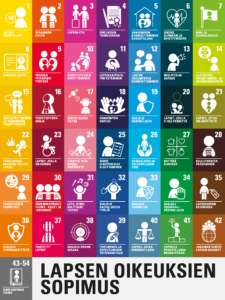Convention on the Rights of the Child briefly
Understanding children’s rights enables their realization. The Child Friendly City model assists municipalities in implementing children’s rights. More information about the Convention on the Rights of the Child on Unicef’s website.

Click the image to enlarge. You can download the poster in jpg format here: CRC_POSTER_LEAFLET_FINAL_fi_paino.jpg (3355×4458) (crasman.fi) (in Finnish)
- Every person under the age of 18 is a child.
- Children’s rights apply to every child. No child may be discriminated against based on their or their parents’ appearance, origin, opinions, or other characteristics.
- In all decisions concerning a child, the best interests of the child must be the primary consideration.
- The state must implement the rights set out in the Convention on the Rights of the Child.
- The state must respect the responsibility, rights, and duties of parents or other legal guardians in the upbringing of the child.
- Every child has the right to life. The state must ensure the best possible conditions for the child’s survival and development.
- Every child must be registered immediately after birth and has the right to a name and nationality, as well as the right to know and be cared for by their parents whenever possible.
- Children have the right to preserve their identity, including nationality, name, and family relations.
- As a general rule, children have the right to live with their parents if it is safe and in their best interests. Children living apart from a parent have the right to regular contact with both parents, unless it is not in the child’s best interest.
- If a child and their parents are in different countries, the state must handle applications for family reunification positively and without delay.
- States must prevent the illegal movement of children across borders.
- Children have the right to express their views in all matters affecting them, and their opinions must be taken into account according to their age and maturity.
- Children may express themselves, as long as their views do not infringe on the rights of others. They have the right to receive information.
- Children have the right to freedom of thought, conscience, and religion. The state must respect the guidance given by parents in exercising these rights.
- Children have the right to organize and participate in associations.
- Children have the right to privacy, home, and confidentiality of correspondence. Their dignity and reputation must be protected.
- Children have the right to access information, for example, through television, radio, and newspapers. The state must encourage media to provide content that supports the child’s well-being and development. Children must be protected from harmful content.
- Parents have the primary responsibility for the upbringing and development of their children. The state must support parents in this task.
- Children must be protected from all forms of violence, neglect, and abuse.
- Children who cannot live with their families have the right to special protection and support from the state. Cultural, religious, and linguistic background and continuity of upbringing must be considered.
- Adoption is permitted if it is the best option for the child.
- Refugee children must be protected, and their rights ensured.
- Children with disabilities must have their special needs recognized and must be able to enjoy a full and fulfilling life.
- Every child has the right to the highest attainable standard of health and to medical care when needed.
- The care and placement of children living outside their families must be regularly reviewed.
- Children have the right to social security.
- Every child has the right to an adequate standard of living for their physical, mental, spiritual, moral, and social development.
- Children have the right to free primary education. The state must promote access to secondary education and prevent dropouts.
- Education must aim to develop the child’s personality and abilities fully, and to respect human rights, parents, and their own and others’ cultures.
- Children belonging to minority or Indigenous groups have the right to their own culture, religion, and language.
- Every child has the right to rest, play, and leisure, and to participate in artistic and cultural life.
- Children must not be made to work in a way that interferes with their education or harms their health or development.
- Children must be protected from drug use.
- Children must be protected from all forms of sexual abuse.
- States must prevent child trafficking. See the Optional Protocol regarding child trafficking and exploitation in prostitution and pornography.
- Children must be protected from all forms of exploitation.
- Children must not be tortured or subjected to cruel or degrading punishment. Deprivation of liberty must be a last resort, and even then, children must be treated humanely and according to their age.
- Children under the age of 18 must not be recruited into armed forces or take part in warfare. Children must be protected in armed conflicts. (Note: the age limit has been raised from 15 to 18 in the Optional Protocol.) See the Optional Protocol on the involvement of children in armed conflict.
- Children who have been victims of abuse must receive help for recovery and reintegration into society.
- Children suspected or accused of breaking the law must be treated with dignity and respect, taking their age into account.
- If national law gives children better rights than the Convention, the national law must be followed.
- States must ensure that all citizens are aware of children’s rights.
- The UN Committee on the Rights of the Child monitors the implementation of this Convention.
- States must regularly report on how children’s rights are being realized.
- Organizations like UNICEF and other UN agencies may monitor and support the implementation of the Convention.
- Articles 54 and onward deal with ratification, entry into force, and amendments of the Convention.